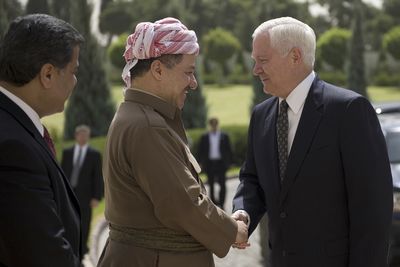Kurdish-Arab resolution urged
Clashes could derail U.S.’s exit, Gates says

INCIRLIK AIR BASE, Turkey – Defense Secretary Robert Gates said Wednesday that the relatively low levels of violence in Iraq and improved cooperation of late between U.S. and Iraqi forces have raised the possibility that commanders might be able to “modestly accelerate” the reduction of U.S. forces this year.
At the same time, defense officials said a Kurdish-Arab flare-up in northern Iraq is the most likely scenario that could derail draw-down plans. Before leaving northern Iraq on Wednesday, Gates pressed Kurdish leaders to resolve their disputes with the Iraqi government in the next few months, while the U.S. still had tens of thousands of soldiers in the country and some influence over Baghdad.
U.S. forces formally pulled out of Iraqi cities on June 30 and, although there has been some tension between U.S. and Iraqi forces in Baghdad, senior military officials said the transition to full Iraqi control of the cities has gone better than U.S. expectations.
“There clearly will be the occasional hiccup by someone who doesn’t get the word, but on the whole we are quite pleased,” Gates said at the conclusion of his two-day visit.
The latest evidence of how the Iraqi government is asserting its independence came Tuesday in Diyala province, when security forces raided an Iranian opposition group that in the past had been protected by the U.S. military in exchange for funneling information about Iran’s nuclear ambitions.
The raid, which was applauded by Tehran and took U.S. officials by surprise, left eight Iranians dead, camp leaders and local officials said. Skirmishes continued on Wednesday.
Gates said if trends throughout Iraq remain generally positive, the U.S. could withdraw three combat brigades, each consisting of about 5,000 soldiers, from Iraq this year. The existing plans call for two brigades to be withdrawn.
Gen. Ray Odierno, the top U.S. commander in Iraq, would have to recommend speeding the pace of the withdrawal before any final decision could be made this fall, Gates said.
“I think there is at least some chance of a modest acceleration because of the way General Odierno sees things going, but that remains to be seen” Gates said. “I mention it only because it is an indication of his view that things are going well.”
The U.S. has about 130,000 troops in Iraq.
Long-running territorial feuds between Arabs and Kurds in northern Iraq, particularly over the oil-rich city of Kirkuk, have erupted into tense standoffs between Kurdish militia fighters and Iraqi army soldiers. U.S. troops and liaison officers, who are embedded in the Kurdish and Iraqi units, have played a critical role in preventing violence.
“We have all sacrificed too much in blood and treasure to see our gains lost over political differences,” Gates told Kurdish President Massoud Barzani during Wednesday’s session.
Pentagon spokesman Geoff Morrell said Gates cautioned Barzani that “very difficult issues remain and that the clock is ticking on our presence.”
The tension between Kurds and Arabs goes back decades. Saddam Hussein’s government attacked Kurdish villages with chemical weapons and razed much of their infrastructure in the years prior to the first Gulf War.
Morrell said that Gates pressed the Kurds not to let those past wrongs dominate the present negotiations. “At every negotiating table, history has a seat,” Morrell quoted Gates as saying. “The challenge is to put history at the end of the table and think about the future rather than the past.”